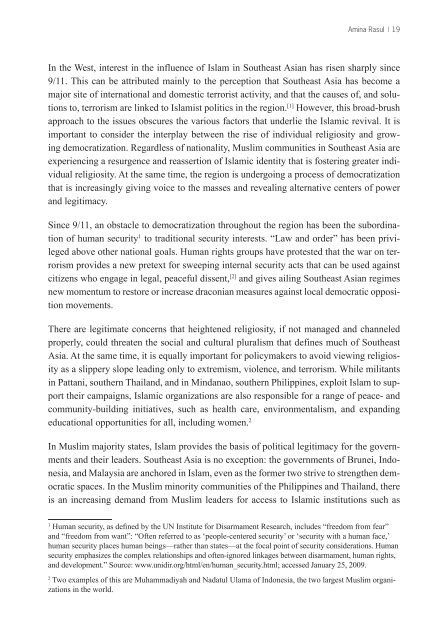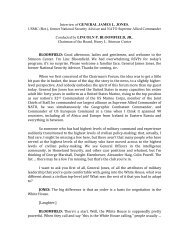Islam and Politics - The Stimson Center
Islam and Politics - The Stimson Center
Islam and Politics - The Stimson Center
You also want an ePaper? Increase the reach of your titles
YUMPU automatically turns print PDFs into web optimized ePapers that Google loves.
Amina Rasul | 19<br />
In the West, interest in the influence of <strong>Islam</strong> in Southeast Asian has risen sharply since<br />
9/11. This can be attributed mainly to the perception that Southeast Asia has become a<br />
major site of international <strong>and</strong> domestic terrorist activity, <strong>and</strong> that the causes of, <strong>and</strong> solutions<br />
to, terrorism are linked to <strong>Islam</strong>ist politics in the region. [1] However, this broad-brush<br />
approach to the issues obscures the various factors that underlie the <strong>Islam</strong>ic revival. It is<br />
important to consider the interplay between the rise of individual religiosity <strong>and</strong> growing<br />
democratization. Regardless of nationality, Muslim communities in Southeast Asia are<br />
experiencing a resurgence <strong>and</strong> reassertion of <strong>Islam</strong>ic identity that is fostering greater individual<br />
religiosity. At the same time, the region is undergoing a process of democratization<br />
that is increasingly giving voice to the masses <strong>and</strong> revealing alternative centers of power<br />
<strong>and</strong> legitimacy.<br />
Since 9/11, an obstacle to democratization throughout the region has been the subordination<br />
of human security 1 to traditional security interests. “Law <strong>and</strong> order” has been privileged<br />
above other national goals. Human rights groups have protested that the war on terrorism<br />
provides a new pretext for sweeping internal security acts that can be used against<br />
citizens who engage in legal, peaceful dissent, [2] <strong>and</strong> gives ailing Southeast Asian regimes<br />
new momentum to restore or increase draconian measures against local democratic opposition<br />
movements.<br />
<strong>The</strong>re are legitimate concerns that heightened religiosity, if not managed <strong>and</strong> channeled<br />
properly, could threaten the social <strong>and</strong> cultural pluralism that defines much of Southeast<br />
Asia. At the same time, it is equally important for policymakers to avoid viewing religiosity<br />
as a slippery slope leading only to extremism, violence, <strong>and</strong> terrorism. While militants<br />
in Pattani, southern Thail<strong>and</strong>, <strong>and</strong> in Mindanao, southern Philippines, exploit <strong>Islam</strong> to support<br />
their campaigns, <strong>Islam</strong>ic organizations are also responsible for a range of peace- <strong>and</strong><br />
community-building initiatives, such as health care, environmentalism, <strong>and</strong> exp<strong>and</strong>ing<br />
educational opportunities for all, including women. 2<br />
In Muslim majority states, <strong>Islam</strong> provides the basis of political legitimacy for the governments<br />
<strong>and</strong> their leaders. Southeast Asia is no exception: the governments of Brunei, Indonesia,<br />
<strong>and</strong> Malaysia are anchored in <strong>Islam</strong>, even as the former two strive to strengthen democratic<br />
spaces. In the Muslim minority communities of the Philippines <strong>and</strong> Thail<strong>and</strong>, there<br />
is an increasing dem<strong>and</strong> from Muslim leaders for access to <strong>Islam</strong>ic institutions such as<br />
1<br />
Human security, as defined by the UN Institute for Disarmament Research, includes “freedom from fear”<br />
<strong>and</strong> “freedom from want”: “Often referred to as ‘people-centered security’ or ‘security with a human face,’<br />
human security places human beings—rather than states—at the focal point of security considerations. Human<br />
security emphasizes the complex relationships <strong>and</strong> often-ignored linkages between disarmament, human rights,<br />
<strong>and</strong> development.” Source: www.unidir.org/html/en/human_security.html; accessed January 25, 2009.<br />
2<br />
Two examples of this are Muhammadiyah <strong>and</strong> Nadatul Ulama of Indonesia, the two largest Muslim organizations<br />
in the world.

















